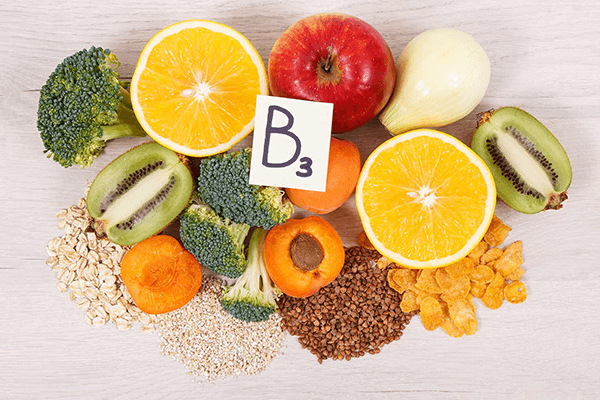- +033 2572 7171
- info@dhanvantary.com

4.5 Rating | 4500 Review

4.5 Rating | 4500 Review
Vitamin B3, also referred to as Niacin, is essential for overall health, similar to other vitamins. Increased intake of this vitamin can enhance cholesterol levels and lower the risk of cardiovascular diseases.

The following are some significant health benefits associated with Vitamin B3:
Vitamin B3 is available in three primary forms: Nicotinic acid, Niacinamide, and Inositol Hexaniacinate. These forms can be found in tablets, doses, or supplements. Nicotinic acid is particularly effective for maintaining healthy cholesterol levels, while Niacinamide is commonly included in nutritional supplements.
Fish is the most significant source of Vitamin B3, with varieties such as salmon, swordfish, baked tuna, rainbow trout, and halibut being particularly rich in this vitamin.
Whole grain cereals with low sugar content are also excellent sources of Vitamin B3. Whole grain bread is another nutritious option.
Lean meats provide a healthy source of this vitamin as well.
Additionally, vegetables and nuts are valuable sources of Vitamin B3. Potatoes, mushrooms, corn, and green peas are vegetables high in this vitamin. Dry roasted peanuts serve as a healthy snack option, and peanut butter is an excellent way to incorporate this vitamin into meals.
The lack of Vitamin B3 can lead to various health issues. Pellagra is the most common condition associated with this deficiency. Additionally, insufficient levels of this vitamin may contribute to other health disorders, including osteoarthritis, schizophrenia, type 1 diabetes, and acne vulgaris. Furthermore, elevated cholesterol levels can also be a consequence of Vitamin B3 deficiency.
It is essential for individuals to consume an adequate amount of Vitamin B3 to support overall health. This adequate amount is referred to as the dietary reference intake.
However, the precise dosage may vary based on individual usage and health needs.
